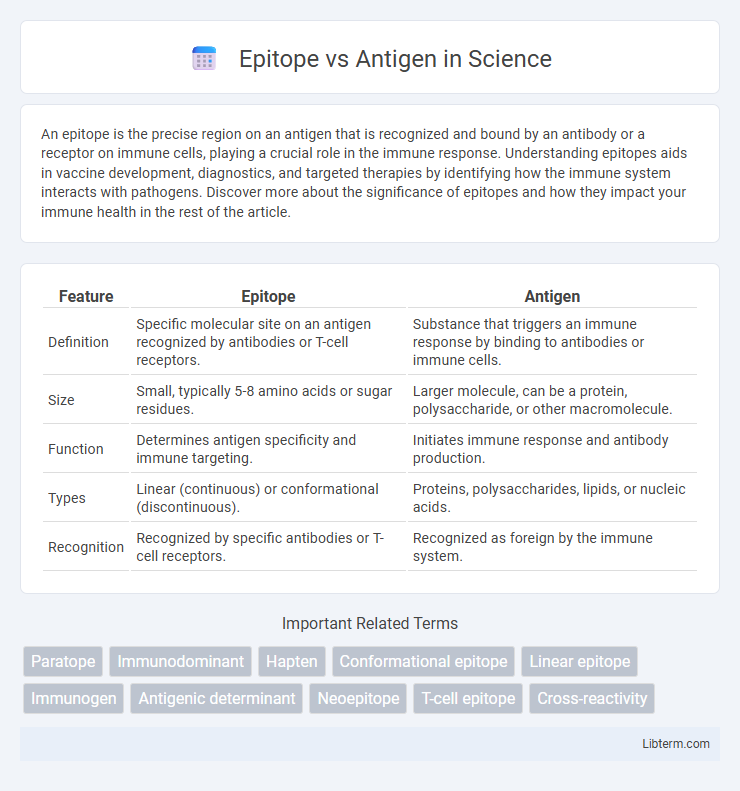An epitope is the precise region on an antigen that is recognized and bound by an antibody or a receptor on immune cells, playing a crucial role in the immune response. Understanding epitopes aids in vaccine development, diagnostics, and targeted therapies by identifying how the immune system interacts with pathogens. Discover more about the significance of epitopes and how they impact your immune health in the rest of the article.
Table of Comparison
| Feature | Epitope | Antigen |
|---|---|---|
| Definition | Specific molecular site on an antigen recognized by antibodies or T-cell receptors. | Substance that triggers an immune response by binding to antibodies or immune cells. |
| Size | Small, typically 5-8 amino acids or sugar residues. | Larger molecule, can be a protein, polysaccharide, or other macromolecule. |
| Function | Determines antigen specificity and immune targeting. | Initiates immune response and antibody production. |
| Types | Linear (continuous) or conformational (discontinuous). | Proteins, polysaccharides, lipids, or nucleic acids. |
| Recognition | Recognized by specific antibodies or T-cell receptors. | Recognized as foreign by the immune system. |
Understanding Antigens: The Basics
An antigen is a foreign substance or molecule, often a protein or polysaccharide, that triggers an immune response in the body. Epitope, also known as the antigenic determinant, is the specific part of the antigen recognized and bound by antibodies or T-cell receptors. Understanding antigens involves recognizing their role in immune defense and how epitopes determine the specificity of antibody binding.
Defining Epitopes: Structure and Function
Epitopes are specific molecular regions on antigens that are recognized by immune receptors such as antibodies or T-cell receptors, typically consisting of a sequence of amino acids or conformational structures. These discrete sites are critical for immune specificity, allowing the immune system to differentiate between diverse pathogens by binding precisely to epitopes within larger antigen structures. Understanding epitope structure and function is essential for vaccine design, immunotherapy, and diagnostic development, as the interaction between epitopes and immune molecules drives adaptive immune responses.
Key Differences: Epitope vs Antigen
An antigen is a large molecule or molecular structure, often a protein or polysaccharide, that triggers an immune response by being recognized as foreign by the immune system. An epitope, also known as an antigenic determinant, is a specific, smaller part or region of the antigen that is directly recognized and bound by antibodies or T-cell receptors. Key differences include size and specificity: antigens encompass entire molecules capable of inducing immunity, while epitopes represent the precise sites on antigens that immune receptors target.
Types of Antigens in Immunology
Antigens in immunology are categorized into exogenous, endogenous, and autoantigens based on their origin, each capable of triggering an immune response. Epitope, also known as an antigenic determinant, is the specific part of the antigen molecule to which an antibody or T-cell receptor binds, crucial for immune system recognition. Understanding the distinction between the whole antigen and its epitopes enhances vaccine development and immunotherapy strategies.
Epitope Classification: Linear vs Conformational
Epitope classification divides into two main types: linear and conformational epitopes, differentiated by their structure and recognition by antibodies. Linear epitopes consist of continuous amino acid sequences within a protein, recognized regardless of protein folding, while conformational epitopes arise from the three-dimensional folding of proteins, involving amino acids that are non-sequential but spatially proximate. Understanding the distinction between linear and conformational epitopes is crucial for vaccine design and antibody development, as it impacts antigen-antibody specificity and immune response efficacy.
Role of Antigens in Immune Response
Antigens are molecules or molecular structures recognized by the immune system as foreign, triggering an immune response to neutralize or eliminate pathogens. They contain specific regions called epitopes, which are the precise sites where antibodies or T-cell receptors bind, enabling immune cells to identify and respond to the threat. The effective interaction between antigens and epitopes is crucial for the activation and specificity of adaptive immunity, leading to targeted immune defense.
How Epitopes Interact with Antibodies
Epitopes, the specific regions on an antigen's surface, directly bind to antibodies through precise molecular interactions, enabling immune recognition. These antigenic determinants can be linear or conformational, influencing how antibodies recognize and neutralize pathogens. The binding affinity between epitopes and antibodies is critical for effective immune responses and diagnostic applications.
Importance of Epitope Mapping in Vaccine Design
Epitope mapping is crucial in vaccine design as it identifies specific regions on an antigen that are recognized by the immune system, enabling targeted immune responses. Precise identification of epitopes allows for the development of vaccines that elicit strong and specific antibody production, enhancing vaccine efficacy against pathogens. Understanding the antigenic determinants through epitope mapping accelerates the creation of next-generation vaccines with improved safety and immune specificity.
Epitope Prediction Techniques in Modern Research
Epitope prediction techniques in modern research utilize bioinformatics tools and machine learning algorithms to identify specific regions on antigens that are recognized by the immune system. These methods analyze protein sequences and structures to predict B-cell and T-cell epitopes, enhancing vaccine design and immunotherapy development. High-throughput computational approaches integrate datasets from structural biology and immunological assays to improve the accuracy of epitope mapping and reduce experimental costs.
Clinical Applications: Antigens and Epitopes in Diagnostics
Epitope and antigen differentiation is crucial for clinical diagnostics, where epitopes serve as specific molecular sites recognized by antibodies, enabling targeted immune detection. Antigens, encompassing entire proteins or pathogens, trigger immune responses and are leveraged in assays such as ELISA and immunohistochemistry to identify infections or autoimmune diseases. Precise epitope mapping enhances diagnostic sensitivity and specificity by allowing the design of monoclonal antibodies and vaccines targeting distinct antigenic determinants.
Epitope Infographic

 libterm.com
libterm.com